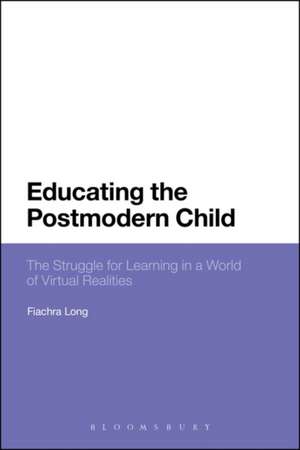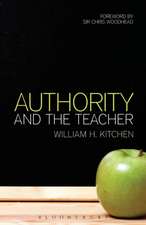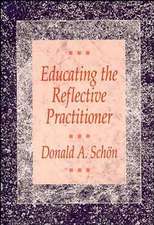Educating the Postmodern Child: The Struggle for Learning in a World of Virtual Realities
Autor Dr Fiachra Longen Limba Engleză Paperback – 7 mai 2014
| Toate formatele și edițiile | Preț | Express |
|---|---|---|
| Paperback (1) | 256.29 lei 6-8 săpt. | |
| Bloomsbury Publishing – 7 mai 2014 | 256.29 lei 6-8 săpt. | |
| Hardback (1) | 889.88 lei 6-8 săpt. | |
| Bloomsbury Publishing – 21 noi 2012 | 889.88 lei 6-8 săpt. |
Preț: 256.29 lei
Preț vechi: 294.77 lei
-13% Nou
Puncte Express: 384
Preț estimativ în valută:
49.04€ • 51.08$ • 40.88£
49.04€ • 51.08$ • 40.88£
Carte tipărită la comandă
Livrare economică 28 martie-11 aprilie
Preluare comenzi: 021 569.72.76
Specificații
ISBN-13: 9781472572035
ISBN-10: 1472572033
Pagini: 208
Dimensiuni: 156 x 234 x 11 mm
Greutate: 0.3 kg
Editura: Bloomsbury Publishing
Colecția Bloomsbury Academic
Locul publicării:London, United Kingdom
ISBN-10: 1472572033
Pagini: 208
Dimensiuni: 156 x 234 x 11 mm
Greutate: 0.3 kg
Editura: Bloomsbury Publishing
Colecția Bloomsbury Academic
Locul publicării:London, United Kingdom
Caracteristici
Each
chapter
includes
a
higher
level
section
for
those
wishing
to
explore
philosophical
concepts
further.
Notă biografică
Fiachra
Longis
Senior
Lecturer
in
Education
at
the
University
College
Cork,
Ireland.
Cuprins
AcknowledgementsSeries
Editor
PrefaceForewordPart
I:
Context1.
Childhood
and
the
Child2.
Child's
Play3.
Empowering
the
Child
in
PostmodernityPart
II:
Appearances4.
The
Global
Child5.
Talent6.
Tactility7.
Visibility8.
InvisibilityPart
III:
Education9.
Vapour
Trails
and
Noise10.
The
Ambassador's
Secret11.
Mind
Games
and
Philosophy12.
ConclusionBibliographyIndex
Recenzii
This
exciting
exploration
of
the
world
of
the
child
in
our
time
draws
on
Fiachra
Long's
immense
erudition
and
on
his
many
years'
experience
as
a
philosopher
and
teacher.
Based
on
careful
reading
of
historical
and
contemporary
literature
taken
from
many
sources,Educating
the
Postmodern
Childgives
evidence
of
the
author's
personal
engagement
with
the
issues
that
he
addresses.
Fiachra
Long
succeeds
in
showing
that
scholarly
inquiry
can
in
fact
be
extraordinarily
interesting.
The
volume
therefore
deserves
to
be
read
not
only
by
those
within
the
philosophical
and
educational
communities
but
also
by
parents
and
by
young
people
themselves.
Fiachra Long's elegant prose teases out the complexities of the postmodern child, offering unique insights and extending the field of childhood studies in new directions. This ground-breaking book challenges the consumer mind-set so prevalent in contemporary education and it cements the case for philosophy in education - a philosophy that can enable the young to navigate the borders between history and 'un-history', past and future, originality and community, private and public, and memory and experience as they try 'to find their own place in an old world'. The reconceptualization of childhood in this innovative book points to the need for scholars of education to engage in rigorous thinking about the fundamental purposes and practices of education.Written by a well-established scholar in an incisive, philosophical style, it is at once challenging and accessible. It will appeal to a wide audience from general readers to academic scholars in the fields of childhood, education, philosophy, sociology and cultural studies.
Fiachra Long's elegant prose teases out the complexities of the postmodern child, offering unique insights and extending the field of childhood studies in new directions. This ground-breaking book challenges the consumer mind-set so prevalent in contemporary education and it cements the case for philosophy in education - a philosophy that can enable the young to navigate the borders between history and 'un-history', past and future, originality and community, private and public, and memory and experience as they try 'to find their own place in an old world'. The reconceptualization of childhood in this innovative book points to the need for scholars of education to engage in rigorous thinking about the fundamental purposes and practices of education.Written by a well-established scholar in an incisive, philosophical style, it is at once challenging and accessible. It will appeal to a wide audience from general readers to academic scholars in the fields of childhood, education, philosophy, sociology and cultural studies.














